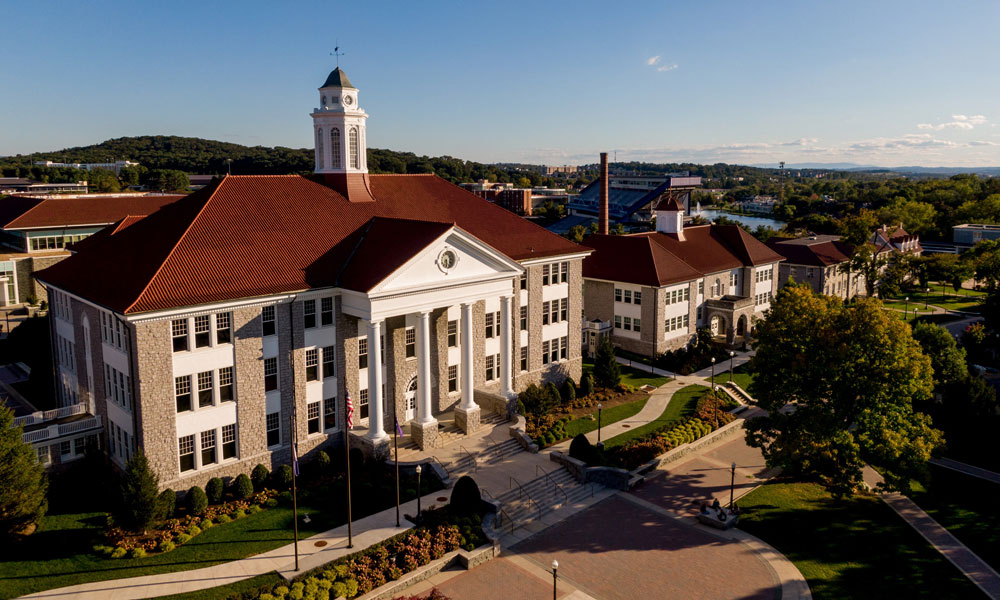Engaging Students Outside of the Classroom within Local Community Organizations
Office of the Provost
When Dr. Tim Thomas and Dr. Aaron Bodle met here at JMU four years ago, they quickly realized they shared an interest in place-based education. Bodle says the idea that students should be engaged outside of the classroom may sound obvious, but “What we’re really talking about is going beyond traditional service learning opportunities that may be built into classes here at JMU and instead, inspiring students to choose to volunteer on their own and have their own kinds of unstructured learning experiences that inform their practice in the classroom.”
On March 3rd, 2014, Thomas and Bodle organized the “The Whole Community - The Whole Child: A Summit to Build Networks of Care for Children in Harrisonburg” event. With 80 people in attendance, the goal was to create an action plan to support local children by gathering community organizations, community leaders and JMU students together to talk about common interests and common problems they see in the community, find out how often community organizations duplicate their efforts, and devise a way to support each other a team.
Unexpectedly, this event gave College of Education students the opportunity to learn about the amazing things that community organizations were doing in Harrisonburg and many were inspired by what these groups were doing, so they volunteered Bodle had informal conversations with his students and the community organizations that attended and he discovered a wonderful opportunity.
“Students were amazed by the great work that people were doing in Harrisonburg and it made them realize they were just two or three volunteer hours away from a very vibrant, community oriented place where people are passionate about solving problems. It’s a place where, if more of our very smart students had opportunities to step out and experience this community they would be learning so many valuable lessons from amazing community leaders, who are doing things that shape the experiences of youth in our community.”
Fast forward to April 2015, Bodle and Thomas wanted to recreate the success of their March 2014 event. They received a $2,000 grant from the JMU Faculty senate to organize the Breaking Bread, Breaking the Bubble Event. The community organizations that attended the March summit were invited back to JMU for several planning sessions over the summer. On September 4th, two area food trucks and 11 different community organizations set up in the courtyard behind Memorial Hall. Over 200 students attended.
Bodell says it was an excellent turnout, and the feedback supports the success of the event. “Students said they really enjoyed the free food and the opportunity to learn a lot about the community groups. The feedback from the community organizations was unanimous: they deeply appreciated that we brought them into the planning process and didn’t just invite them to come to something that was already preplanned, that we listened and responded to their needs, that we brought in local businesses which they want to support as well, and that they left with more signatures than they typically get and more interested potential volunteers then they wouldn’t get at a typical resource fair.”
For Dr. Bodle, the support from his colleagues was the icing on the cake: “Now in my fourth year here at JMU, I felt so good about the college-wide involvement: I could not believe the number of faculty that attended, that had questions, that actively made an effort to encourage their students to come – some even stopped in the middle of their instruction time and brought their students. I walked away feeling very embraced and supported by my colleagues and the administration as well”
How can Alumni Help?
This was the first year for this event and the college would love see this happen again, but there are a few challenges: every year but there are two problems:
- Bodle and Thomas devoted the entire summer to the success of this event. The challenges of scholarship and other academic responsibilities make it unrealistic for them to continue to spearhead the planning and execution of this event every year for the foreseeable future. If you are interested in supporting the logistics of the event, you can contact them by email.
- This event was grant-funded, and we can’t count on that grant money every year even though the benefits may be obvious, says Bodle:
“The great news is, with a fairly small amount of support from a donor, we could make this a continuous budget item. That donation would go such a long way toward the big civic engagement investment we are trying to make as a University. The College of Education could become a model for the university with this extremely successful event. In just a few hours we are able to bring our students the opportunity to become self-motivated to volunteer in the community. A donation that would sustain this year to year gives us the opportunity to say, ‘We’re taking engagement seriously, and we want to share with you what we’ve learned so you can duplicate this in the future’. It would be a really valuable thing for the college, for our community, and our students, to position ourselves in a way that says “on a fairly small budget you’re getting between 200 to 300 people out there to volunteer on their own and if nothing else step outside their bubble for a few minutes.”
For more photos of the event, please visit the Flickr Album: https://flic.kr/s/aHskn5TvNL
